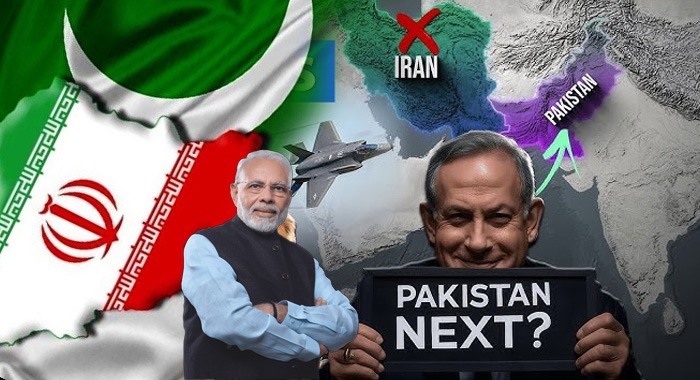The events of June 12, 2025, marked a dangerous new chapter in Middle Eastern geopolitics as Israel launched direct strikes on Iran’s nuclear facilities without prior warning. The attacks targeted senior Iranian military officers and nuclear scientists, with Israeli officials openly declaring that such operations would continue until Tehran’s nuclear program was “completely dismantled.”
The aggressive rhetoric reached new heights when Israel’s defence minister threatened to “reduce Tehran to ashes” if Iran dared to retaliate. These warnings weren’t hollow: Israeli aircraft, operating freely through Jordan, Syria, and Iraq’s airspace, demonstrated that the architecture for Iran’s strategic isolation was well in place.
If Iran succumbs to the same fate that dismantled Syria and Iraq, it would leave Pakistan, Iran’s immediate eastern neighbour, geopolitically exposed to Israeli and allied military reach. What is currently a war of containment could swiftly become a regional encirclement, with Pakistan positioned as the next “strategic obstacle” to be neutralized.
Pakistan already faces heightened tension with India, its longtime rival. Recent clashes have shown India’s increasing dependence on Israeli military technology, including drones, missile defence systems, and advanced surveillance tools. These are no longer covert deals, they are being publicly deployed in South Asian confrontations, underscoring a military and ideological partnership between New Delhi and Tel Aviv.
But the stakes go beyond conventional warfare. This is not just about arms sales or border disputes. The India-Israel nexus represents a broader regional doctrine, one that seeks to reshape South Asia’s balance of power through military dominance, diplomatic isolation, and strategic destabilisation of states like Pakistan and Iran.
The road map is chillingly familiar.
Iraq was first, weakened by years of war, sanctions, and finally, a full-scale invasion under the pretext of weapons of mass destruction.
Syria, a functioning state, was dismantled through civil war and external interference, allowing Israel to dominate its airspace with zero resistance.
Now, Iran stands increasingly alone, caught in a web of internal unrest, diplomatic fatigue, and escalating attacks on its sovereignty.
If Iran falls into this pattern, Pakistan becomes the next natural target, not by choice, but by geography, by proximity, and by strategic necessity in this expanding doctrine.
Unlike tactical alliances, the India-Israel relationship is deeply ideological, rooted in ultra-nationalist visions that perceive Muslim-majority neighbours not just as threats, but as obstacles to regional hegemony.
India, under its current leadership, has systematically aligned itself with Israel not just for defence procurement but to mirror its narrative strategies, framing dissent as terrorism, branding sovereignty as subversion, and using cyber tools and propaganda to destabilise adversaries.
The recent use of Israeli spyware, cyber-warfare against Pakistan, and alleged joint intelligence operations in Chabahar and Balochistan highlight how the battlefield has already crossed from conventional to hybrid warfare.
This is not merely Iran’s war, or Palestine’s cause. It is a pan-regional strategy that threatens all sovereign Islamic nations, not simultaneously, but sequentially. The only variable is time.
If this continues unchecked, Pakistan could find itself in the same position as Syria and Iraq, forced into reactive diplomacy, weakened by hybrid threats, and left diplomatically isolated as air corridors and alliances tighten around it.
The question, then, is not whether Pakistan is a target, but when and how.
The silence of the region’s key players, Saudi Arabia, UAE, Qatar, and Turkey, will only embolden further aggression. Only a united regional doctrine, beyond sectarian and economic divides, can reverse this momentum. Without this shift, Pakistan and other Islamic nations will remain vulnerable, divided, and reactive.
It is time for Islamabad to re-calibrate its foreign policy, not as a solo actor but as part of a collective front. Diplomatic engagements with Iran, China, Turkey, and even strategic understandings with Gulf nations must be prioritized over appeasement or tactical silence.
While the world’s attention remains fixed on Ukraine, Gaza, and Taiwan, the quiet encirclement of Iran and Pakistan continues with alarming precision. The dismantling of resistance, be it military, ideological, or diplomatic, is underway.
The India-Israel partnership is not about regional stability. It is about rewriting regional hierarchies, and unless countered through unity, Pakistan could find itself next on the board, a pawn surrounded, and silenced, without ever having moved.
As the ancient proverb warns: “When they came for the others, I stayed silent. When they came for me, no one was left to speak.”





